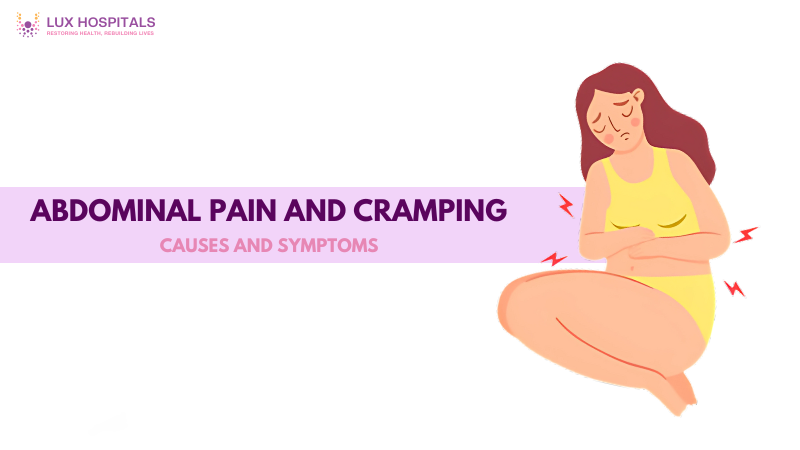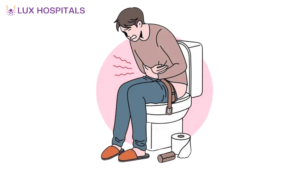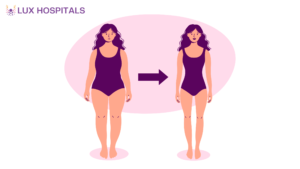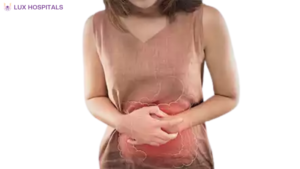Abdominal Cramping: What It Means and How to Manage It

At some point, almost everyone has cramps and a stomachache. These unpleasant feelings, which range in intensity from moderate to severe, might come on suddenly or gradually. Knowing what’s typical and what isn’t is crucial, regardless of whether the problem is brought on by chronic illness or digestive problems. Understanding what’s normal and what’s not is essential. Identifying the source of abdominal pain and cramping early can help prevent complications and improve your quality of life. This guide explores the common causes, symptoms, and when you should seek medical attention for abdominal pain and cramping.
Common Causes of Abdominal Pain and Cramping
- Abdominal pain and cramping: can be caused by numerous temporary or chronic issues, ranging from something as simple as overeating to more serious infections.
- Gas and Indigestion: Gas buildup from swallowing air or consuming gassy foods causes bloating and sharp cramping. Poor digestion, especially after heavy meals, often leads to upper abdominal discomfort.
- Constipation: Hard stools or infrequent bowel movements stretch the intestines, leading to pressure and pain that may last for days if untreated.
- Food Intolerances: Conditions like lactose or gluten intolerance affect digestion, causing bloating, diarrhea, abdominal pain, and cramping after meals.
- Infections: Bacterial or viral infections, such as gastroenteritis, can result in intense cramps, vomiting, and diarrhea, often requiring rest and hydration.
- Menstrual Cramps: In women, hormonal fluctuations during menstruation can cause recurring abdominal pain and cramping, sometimes severe enough to limit daily activities.
These causes can often be managed with lifestyle changes or medication, but it is important to monitor how often symptoms occur.
Why Your Stomach Hurts Often?
Some people experience abdominal pain and cramping regularly due to chronic illnesses. Understanding these conditions can help in long-term symptom management.
- IBS: The widespread condition known as Irritable Bowel Syndrome (IBS) alters the patterns of bowel movements. IBS patients often complain of cramping, bloating, gas, and alternating constipation or diarrhea.
- Inflammatory Bowel Disease (IBD): Includes Crohn’s disease and ulcerative colitis. These conditions involve chronic inflammation of the gut, leading to severe pain, fatigue, and weight loss.
- Endometriosis: Is a painful disorder where uterine tissue grows outside the uterus. This can cause deep abdominal pain and cramping, especially during periods or ovulation.
- Celiac Disease: An autoimmune response to gluten that damages the intestinal lining. This condition often causes gas, malabsorption, and painful cramps after eating gluten
Chronic conditions require long-term treatment and lifestyle adjustments to manage flare-ups and prevent complications.
Symptoms That Accompany Cramping
Abdominal pain and cramping rarely occur alone. The presence of accompanying symptoms can help diagnose the underlying cause.
- Nausea and Vomiting: These often accompany food poisoning, stomach flu, or pregnancy-related discomfort, especially when digestion is impaired.
- Diarrhea or Constipation: These symptoms are strong indicators of gastrointestinal distress and may signal IBS, infections, or poor diet.
- Bloating and Gas: Persistent gas and bloating can increase the sensation of abdominal pain and cramping, especially after meals.
- Fever: A fever with cramps is usually a sign of an infection and should not be ignored if it persists for more than 24 hours.
- Back Pain or Pelvic Pressure: Pain that radiates to the back or causes heaviness in the pelvis may point to gynecological issues or kidney problems.
Tracking these symptoms can help your doctor provide a more accurate diagnosis and treatment plan.
When to Worry About Abdominal Pain and Cramping?
Not all abdominal pain and cramping is harmless. Knowing the warning signs of a serious condition can be life-saving.
You should see a doctor or visit the emergency room if:
- The pain is sharp and sudden, particularly in one area, like the lower right side, which may suggest appendicitis.
- Visible blood in vomit, stool, or urine may indicate bleeding in the digestive or urinary tract.
- Pain that lasts more than 24-48 hours, becomes more severe, or interferes with walking or eating.
- Along with the cramps, dizziness, fainting, or a high fever appears—these could be signs of infection or internal bleeding.
- During pregnancy, any intense abdominal pain and cramping must be evaluated promptly to rule out complications.
Waiting too long in these circumstances may exacerbate the disease and raise the possibility of complications.
How to Relieve Abdominal Pain and Cramping?
There are several safe and effective ways to manage abdominal pain and cramping, especially if they are mild and not caused by a serious condition.
- Hydration: Staying hydrated supports digestion and helps move waste through the intestines. Dehydration can worsen cramps and constipation.
- Dietary Adjustments: Avoid spicy, fatty, or high-fiber foods during flare-ups. Focus on easy-to-digest foods like bananas, rice, toast, and applesauce.
- Heat Therapy: Applying a warm compress or heating pad to your stomach area can relax muscles and reduce the intensity of cramping.
- OTC Medications: Antacids for indigestion, simethicone for gas, or stool softeners for constipation can relieve abdominal pain and cramping.
- Rest and Relaxation: It is essential to give your body time to heal, especially during illness. Stress reduction also helps if anxiety is contributing to symptoms.
Constantly monitor your response to treatments and consult a healthcare provider for ongoing issues.
Prevention Tips
Preventing abdominal pain and cramping involves adopting healthy lifestyle habits and being aware of personal triggers.
- Eat Smaller, Slower Meals: This reduces strain on digestion and helps prevent gas and bloating.
- Keep a Food Diary: Tracking your food helps identify intolerance or allergy-related symptoms.
- Exercise Regularly: Physical activity improves digestion and bowel movements while reducing stress levels.
- Manage Stress: High stress levels can trigger or worsen abdominal pain and cramping, notably in IBS patients.
- Stay Regular with Screenings: If you’re prone to GI symptoms or have a family history of digestive diseases, routine checkups can help detect problems early.
Prevention is often the best medicine when dealing with recurring digestive discomfort.
Conclusion
From minor digestive problems to serious medical diseases, there are numerous possible causes for the common symptoms of abdominal discomfort and cramps. Complications can be avoided by identifying warning signs and getting help when needed. When abdominal pain and cramps are properly managed and prevented, whether they are brought on by a transient discomfort or a persistent sickness, better health and peace of mind result. While most cases are harmless and resolve with rest and simple treatments, some require urgent care. Understanding the possible causes and warning signs helps you take the right action at the right time.
Frequently Asked Questions
Sudden abdominal pain and cramping can be caused by gastrointestinal infections, gas, food intolerances, or reproductive system issues. The pain can be sharp, short-lived, or ongoing, depending on the cause. Medical attention is needed if pain worsens quickly or other symptoms appear.
Severe abdominal pain and cramping often come with additional symptoms like high fever, persistent vomiting, or blood in the stool. Pain that doesn’t improve or worsen may indicate appendicitis, ulcers, or gallstones. A healthcare provider should evaluate unexplained or ongoing pain.
Yes, stress can directly impact your digestive system, often leading to abdominal pain and cramping, notably in IBS patients. Stress hormones affect gut motility and sensitivity. Reducing stress through techniques like meditation can help control symptoms.
Quick relief for abdominal pain and cramping includes using a heating pad, drinking herbal teas, and taking antacids or antispasmodic medications. Avoiding heavy or trigger foods can also provide fast comfort. If symptoms are severe or persistent, see a doctor.
You can try heat therapy, gentle exercise, drinking herbal teas like peppermint, and eating light meals. These methods may ease minor abdominal pain and cramping caused by gas or indigestion. However, persistent or severe pain needs medical evaluation.





















